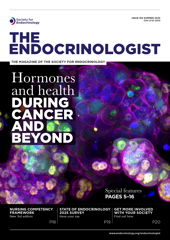Due to advances in cancer treatment, survival rates among childhood cancer patients have improved significantly. Survival now exceeds 80% in many childhood malignancies. However, survivors may face a range of reproductive complications, including abnormalities in pubertal development (e.g. precocious puberty, or delayed or absent puberty), menstrual dysfunction, endocrine disorders, infertility, and complications in pregnancy or labour. Fertility-related concerns are consistently ranked among the top five unmet needs during the survivorship period.1
INCREASED RESPONSIBILITY FOR NURSES
'Fertility-related concerns are consistently ranked among the top five unmet needs during the survivorship period.'
As the survival rates of childhood cancer continue to rise, the nursing responsibility to address issues relating to quality of life will be more important, including fertility preservation and reproductive health counselling. Nurses who care for survivors of childhood and adolescent cancer must understand and anticipate long-term, treatment-related complications, such as gonadal insufficiency and impaired fertility.
The risk of infertility is influenced by the location of the cancer, as well as the type, dose and combination of cytotoxic therapies used. Additionally, factors such as the patient’s age at treatment, sex, and genetic predispositions further affect the risk of permanent infertility.
Survivors are particularly vulnerable to infertility following radiotherapy and treatment with alkylating agents, both of which have dose-dependent gonadotoxic effects. Specific treatment thresholds associated with a significantly elevated infertility risk include:
• testicular radiation >4Gy
• ovarian radiation >5Gy
• hypothalamic–pituitary radiation >22–30Gy (in females)
• total body irradiation (TBI).
These exposures are known to contribute to premature gonadal failure and permanent infertility.2,3 Radiation impacting the ovaries and uterus has also been linked to pregnancy complications, such as spontaneous abortion, preterm labour, fetal malposition and low birth weight.4
MEETING THE NEED
Fertility concerns can greatly affect the long-term quality of life of survivors of childhood cancer. While international guidelines for fertility preservation exist, there remains a lack of specific recommendations on how to deliver fertility counselling to adolescents. For nurses (who often serve as consistent points of contact and sources of emotional support), this gap presents both a challenge and an opportunity.
Barriers to fertility discussions include the urgency of initiating cancer treatment, poor prognosis, and cultural or religious considerations. Nurses are in a key position to assess emotional readiness, provide developmentally appropriate education, and advocate for patient and family needs within the multidisciplinary team.
Nurses hold a pivotal position in the continuum of care for survivors of childhood cancer, particularly when it comes to addressing fertility-related concerns. As trusted healthcare providers who often build long-term relationships with patients and their families, nurses are uniquely equipped to provide education, support and advocacy throughout the cancer journey and beyond. Nurses play a vital role in delivering clear, age-appropriate information about the potential impact of cancer treatments on fertility. They help demystify complex medical information, ensuring that patients and caregivers understand the risks and available fertility preservation options.
THE IMPORTANCE OF TIMELY INFORMATION
'As frontline providers, nurses have valuable insights into patient needs and care gaps.'
By providing this education early in the treatment process, nurses empower families to make informed decisions in a timely manner. Early discussions about fertility are crucial, yet often overlooked due to the urgency of initiating treatment. Nurses are well-positioned to advocate for and initiate timely fertility counselling before treatment begins.
They also help co-ordinate long-term follow-up, reinforcing the importance of monitoring reproductive health as part of survivorship care. Nurses can advocate for policies and practices that promote equity in access to fertility clinics. This includes raising awareness within healthcare teams, and working for changes that integrate fertility care into routine follow-up after childhood cancer.
INFORMING BEST PRACTICE
As frontline providers, nurses have valuable insights into patient needs and care gaps. By engaging in or supporting research, nurses contribute to a growing body of evidence that can inform best practice in fertility preservation. Their involvement helps to shape guidelines, improve care delivery and, ultimately, enhance survivorship outcomes. Additionally, nurses can advocate for equitable access to fertility preservation services. This includes raising awareness among healthcare providers, promoting institutional changes, and working towards the integration of fertility care into standard survivorship protocols.
Nurses in oncology care also bring valuable insights into patient needs and systemic gaps. Their participation in clinical research contributes to a growing body of evidence that informs best practice and supports the development of standardised fertility care guidelines. Ultimately, such involvement enhances survivorship outcomes and supports high quality, patient-centred care.
Fertility-related psychological distress can be profound. Through compassionate nursing interventions, including emotional support, active listening and timely referral to mental health services, nurses can reduce anxiety and create an environment where patients and families feel more open to discussion. This foundation of trust and support is essential for delivering personalised survivorship care that addresses both physical and emotional well-being.
As the population of childhood cancer survivors grows, so too does the imperative for nurses to lead efforts in promoting long-term reproductive health and overall quality of life.
CECILIA FOLLIN
Clinical Nurse Specialist, Associate Professor, Department of Oncology, Skåne University Hospital, Sweden
REFERENCES
- Murphy D et al. 2015 Cancer https://doi.org/10.1002/cncr.29466.
- Skinner R et al. 2017 Lancet Oncology https://doi.org/10.1016/s1470-2045(17)30026-8.
- van Dorp W et al. 2018 Journal of Clinical Oncology https://doi.org/10.1200/jco.2017.76.3441.
- Hudson MM 2010 Obstetrics & Gynecology https://doi.org/10.1097/aog.0b013e3181f87c4b
Access the 3rd Edition of our Competency Framework for Adult Endocrine Nursing






